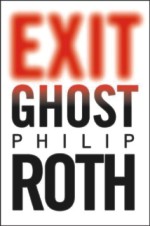|
Book Review
Exit Ghost
Dale Singer
 On the page of this novel that lists previous books by Philip Roth, the titles are categorised: Zuckerman books, Roth books, Kepesh books and others. On the page of this novel that lists previous books by Philip Roth, the titles are categorised: Zuckerman books, Roth books, Kepesh books and others.
But anyone who has followed the career of perhaps America's finest living novelist knows how artificial such divisions are. No matter what the character's name, he's got a large part of Roth inside him.
So it is with this apparently final tale featuring Nathan Zuckerman, Roth's longtime alter ego. Like Roth, he was born in New Jersey in 1933 and is a distinguished writer, whose career has not been without controversy. Introduced in "The Ghost Writer" in 1979, Zuckerman has appeared intermittently, sometimes the main character, other times as in "American Pastoral" or "The Human Stain" an observer/Greek chorus.
In "Exit Ghost," he is suffering from impotence and incontinence, the aftermath of prostate cancer surgery. Going to New York City for treatment, he leaves the New England idyll where he has exiled himself for years to write without the temptations and distractions of the big city. As soon as he arrives, just before the 2004 election, conflicts rush into his life again:
* A chance meeting with an old, ailing girlfriend of the late novelist E.I. Lonoff, a mentor of Zuckerman and another Roth creation that puts one more layer onto his fiction-reality matrix.
* A young couple with whom Zuckerman impulsively enters a switch-of-residence agreement, then immediately regrets his decision.
A brash, pushy young writer, Richard Kliman, who is a friend of the young couple. He badgers Zuckerman into helping write a tell-all biography of Lonoff, using the assistance of Lonoff's old girlfriend.
These interconnections let Roth weave his typical, finely textured narrative, infused with a strong, elegaic sense of loss as Zuckerman looks back on his life and its jarring contrast with the city's frenetic, yet exuberant, post-9/11 atmosphere.
Zuckerman revels in the exhilaration of a spirited argument with Kliman, which rouses "the virility in me again, the virility of mind and spirit and desire and intention and wanting to be with people again and have a fight again and have a woman again and feeling the pleasure of one's power again."
More often, he must confront the unpleasant reality that Kliman presents to him starkly in their first conversation-confrontation: "Look, old men hate young men."
One feature of "Exit Ghost" seems out of place, at least at first: a series of imagined dialogues interspersed in Zuckerman's first-person narration. Most of them are with Jamie Logan, a young woman who has reawakened his sexual passions. The frank exchanges are typical Roth and provide one more level on which the narrative plays out.
They are skillfully done, so much so that the reader may momentarily forget that the repartee between Zuckerman and Jamie is an invention of the protagonist. Of course, none of the action is real; it's all only a novel. Yet, with Zuckerman so closely entwined with Roth, it sometimes becomes hard to separate the real from the invented from the imagined.
That's how stories play out in the hands of a writer such as Roth, whose powers improve with age. So, in the language of stage directions (and in keeping with the Zuckerman dialogues), "Exit Ghost" and, by implication, exit Zuckerman as well. As long as Roth stays and keeps writing books as moving and accomplished as this one, readers will be more than satisfied.
This review first appeared in the St. Louis Post-Dispatch.
Copyright
(R) thedailystar.net 2007 |
